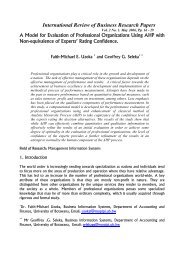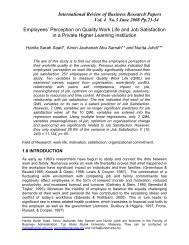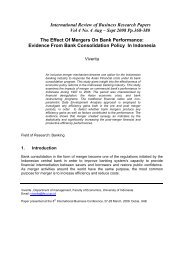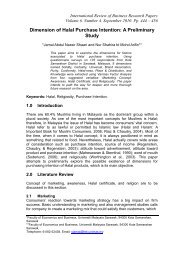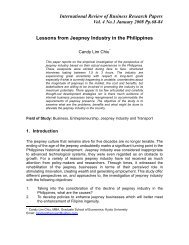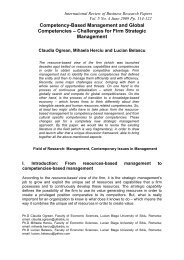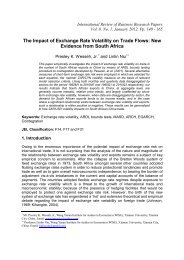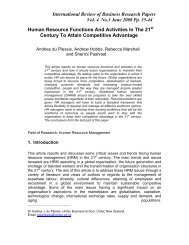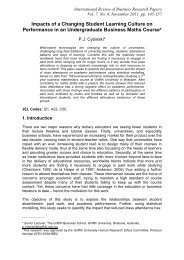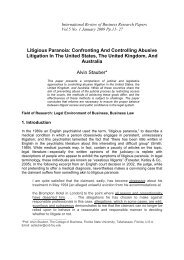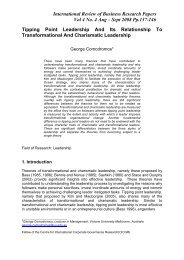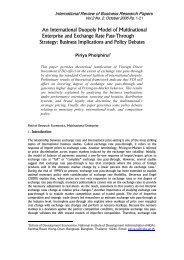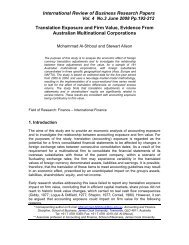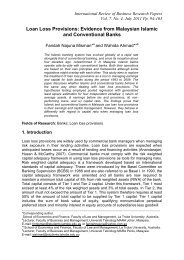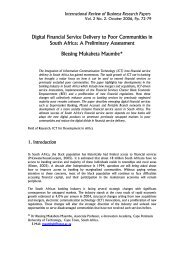Firm Performance and Corporate Governance Through Ownership ...
Firm Performance and Corporate Governance Through Ownership ...
Firm Performance and Corporate Governance Through Ownership ...
You also want an ePaper? Increase the reach of your titles
YUMPU automatically turns print PDFs into web optimized ePapers that Google loves.
Imam & Malik 107<br />
Though we could not get the chance to establish the relationship between institutional<br />
holding <strong>and</strong> firm performance but it is observed here that firm’s dividend payout ratio<br />
<strong>and</strong> institutional ownership is significantly related as role of large institutions in<br />
corporate governance is particularly important in countries where legal protection of<br />
shareholders' interest is weak for historical <strong>and</strong> institutional reasons-- a situation exists<br />
in many transition economies. Here, we also find that a large fraction of cross-sectional<br />
variation in share-holding pattern is explained by unobserved firm heterogeneity. First, it<br />
is suggested that the unobserved heterogeneity has important implications for<br />
econometric models, to estimate the effect of share-holding pattern on firm<br />
performance. Second, it is suggested that there could be endogeneity of ownership in<br />
transition economies -- it could be the case that institution owners can choose to buy<br />
shares in better performing firms, <strong>and</strong> leave all poorly performing ones in the h<strong>and</strong>s of<br />
the pubic. The problem of reverse causality needs to be addressed. Does ownership<br />
affect performance or causality runs from performance to ownership<br />
Here, political argument, inadequate legal protection for minority shareholders or private<br />
benefit of control deserves careful investigation for the explanation of the variations in<br />
ownership structure of Bangladeshi listed firms. In the context of Australia, Lamba <strong>and</strong><br />
Stapledon (2002) provide evidence that related party transactions give rise to private<br />
benefits of control <strong>and</strong> that could explain why ownership structure is concentrated in the<br />
h<strong>and</strong>s of few family members. However, given the results produced by the current<br />
study, it is clear that there are many questions relating to the relationship between share<br />
holding pattern <strong>and</strong> performance of the firm, which remains unresolved. One other<br />
useful extension of this analysis would be to include additional policy variables<br />
measuring changes in the market conditions, political <strong>and</strong> legal scenario identity of the<br />
top shareholders <strong>and</strong> other dimensions to judge agency conflict. It is pertinent to know<br />
whether there exist any large non-management blockholders among the top<br />
shareholders. This is important because this blockholder could either both monitor<br />
management <strong>and</strong> help protect minority shareholders or collude with management to<br />
expropriate minority interests.<br />
References<br />
Bangladesh Enterprise Institute. Principles from the code of corporate governance for<br />
Bangladesh, March 2004, Taskforce on <strong>Corporate</strong> <strong>Governance</strong>.<br />
Bebchuk Lucian A., 1999, “A Theory of Path Dependence in <strong>Corporate</strong> <strong>Governance</strong> <strong>and</strong><br />
<strong>Ownership</strong>”, Working paper 131, Harvard University Law School.<br />
Beni Lauterbach, <strong>and</strong> Efrat Tolkowsky, 2004, “Market Value Maximizing <strong>Ownership</strong><br />
Structure when Investor Protection is Weak”, Discussion Paper No. 8-200<br />
Berglöf Erik <strong>and</strong> Stijn Claessens. 2004. “<strong>Corporate</strong> <strong>Governance</strong> <strong>and</strong> Enforcement”,<br />
Discussion Paper 3409, World Bank Policy Research.<br />
107



